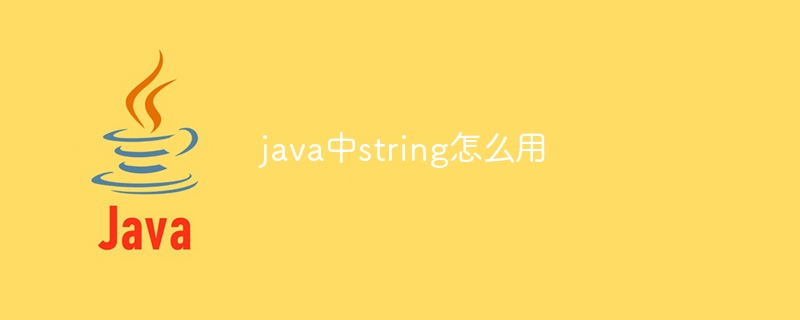How to use string in java
In Java, String is a class that represents text data, essentially an immutable sequence of characters. You can create a String using a double-quoted literal or the String constructor, but using literals is generally recommended. String characters can be accessed using the charAt() and substring() methods. Since String is immutable, concatenation or substitution is required to modify the value. The String class provides several useful methods such as length(), isEmpty(), compareTo(), and toLowerCase().

Using String in Java
What is String?
String is a class that represents text data in Java. It is a sequence of characters, essentially an immutable object.
Creating a String
The easiest way to create a String is to use text enclosed in double quotes:
String myString = "Hello World";
You can also use the String constructor, but Generally not recommended:
String myString = new String("Hello World");Access String characters
You can use the charAt() method to access a single character in String:
char myChar = myString.charAt(0); // 获取第一个字符('H')
You can also use the substring() method to extract part of the string:
String substring = myString.substring(0, 5); // 获取前 5 个字符("Hello")
Modify the String
Since String is immutable, Its value cannot be modified directly. However, you can use the concat() method to concatenate another string:
myString = myString.concat("!"); // 现在 myString 等于 "Hello World!" You can also use the replace() method to replace characters in a string:
myString = myString.replace("World", "Universe"); // 现在 myString 等于 "Hello Universe!"String Methods
The String class provides a number of useful methods, including:
-
length(): Return The length of the string -
isEmpty(): Check whether the string is empty -
compareTo(): Compare two strings -
equalsIgnoreCase(): Compare two strings ignoring case -
toLowerCase(): Convert the string to lowercase -
toUpperCase(): Convert a string to uppercase
When to use String
When using String, you need to pay attention to the following situations:
- Strings are immutable, which means they cannot be modified directly.
- For large amounts of text data, it is more efficient to use
StringBuilderorStringBuffer. - For text formatting and manipulation, you can use classes in the
String.format()orjava.textpackage.
The above is the detailed content of How to use string in java. For more information, please follow other related articles on the PHP Chinese website!

Hot AI Tools

Undresser.AI Undress
AI-powered app for creating realistic nude photos

AI Clothes Remover
Online AI tool for removing clothes from photos.

Undress AI Tool
Undress images for free

Clothoff.io
AI clothes remover

AI Hentai Generator
Generate AI Hentai for free.

Hot Article

Hot Tools

Notepad++7.3.1
Easy-to-use and free code editor

SublimeText3 Chinese version
Chinese version, very easy to use

Zend Studio 13.0.1
Powerful PHP integrated development environment

Dreamweaver CS6
Visual web development tools

SublimeText3 Mac version
God-level code editing software (SublimeText3)

Hot Topics
 Top 4 JavaScript Frameworks in 2025: React, Angular, Vue, Svelte
Mar 07, 2025 pm 06:09 PM
Top 4 JavaScript Frameworks in 2025: React, Angular, Vue, Svelte
Mar 07, 2025 pm 06:09 PM
This article analyzes the top four JavaScript frameworks (React, Angular, Vue, Svelte) in 2025, comparing their performance, scalability, and future prospects. While all remain dominant due to strong communities and ecosystems, their relative popul
 Spring Boot SnakeYAML 2.0 CVE-2022-1471 Issue Fixed
Mar 07, 2025 pm 05:52 PM
Spring Boot SnakeYAML 2.0 CVE-2022-1471 Issue Fixed
Mar 07, 2025 pm 05:52 PM
This article addresses the CVE-2022-1471 vulnerability in SnakeYAML, a critical flaw allowing remote code execution. It details how upgrading Spring Boot applications to SnakeYAML 1.33 or later mitigates this risk, emphasizing that dependency updat
 How does Java's classloading mechanism work, including different classloaders and their delegation models?
Mar 17, 2025 pm 05:35 PM
How does Java's classloading mechanism work, including different classloaders and their delegation models?
Mar 17, 2025 pm 05:35 PM
Java's classloading involves loading, linking, and initializing classes using a hierarchical system with Bootstrap, Extension, and Application classloaders. The parent delegation model ensures core classes are loaded first, affecting custom class loa
 How do I implement multi-level caching in Java applications using libraries like Caffeine or Guava Cache?
Mar 17, 2025 pm 05:44 PM
How do I implement multi-level caching in Java applications using libraries like Caffeine or Guava Cache?
Mar 17, 2025 pm 05:44 PM
The article discusses implementing multi-level caching in Java using Caffeine and Guava Cache to enhance application performance. It covers setup, integration, and performance benefits, along with configuration and eviction policy management best pra
 Node.js 20: Key Performance Boosts and New Features
Mar 07, 2025 pm 06:12 PM
Node.js 20: Key Performance Boosts and New Features
Mar 07, 2025 pm 06:12 PM
Node.js 20 significantly enhances performance via V8 engine improvements, notably faster garbage collection and I/O. New features include better WebAssembly support and refined debugging tools, boosting developer productivity and application speed.
 Iceberg: The Future of Data Lake Tables
Mar 07, 2025 pm 06:31 PM
Iceberg: The Future of Data Lake Tables
Mar 07, 2025 pm 06:31 PM
Iceberg, an open table format for large analytical datasets, improves data lake performance and scalability. It addresses limitations of Parquet/ORC through internal metadata management, enabling efficient schema evolution, time travel, concurrent w
 How to Share Data Between Steps in Cucumber
Mar 07, 2025 pm 05:55 PM
How to Share Data Between Steps in Cucumber
Mar 07, 2025 pm 05:55 PM
This article explores methods for sharing data between Cucumber steps, comparing scenario context, global variables, argument passing, and data structures. It emphasizes best practices for maintainability, including concise context use, descriptive
 How can I implement functional programming techniques in Java?
Mar 11, 2025 pm 05:51 PM
How can I implement functional programming techniques in Java?
Mar 11, 2025 pm 05:51 PM
This article explores integrating functional programming into Java using lambda expressions, Streams API, method references, and Optional. It highlights benefits like improved code readability and maintainability through conciseness and immutability






